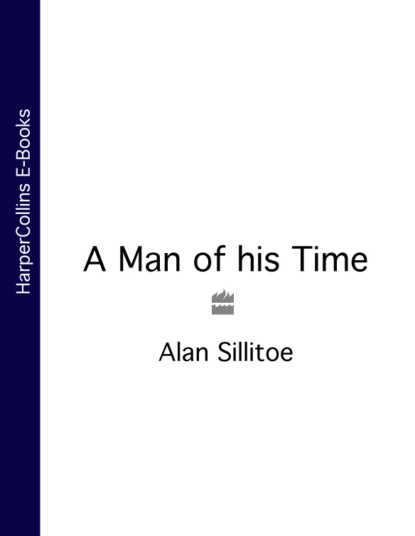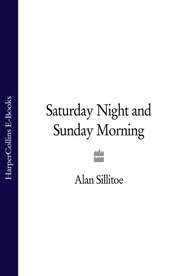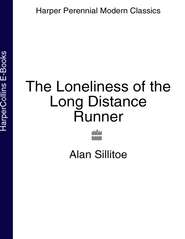По всем вопросам обращайтесь на: info@litportal.ru
(©) 2003-2024.
✖
A Man of his Time
Настройки чтения
Размер шрифта
Высота строк
Поля
Sillitoe and the Smith
Sillitoe on Screen (#litres_trial_promo)
Read On (#litres_trial_promo)
Alan Sillitoe on Reading
The Nottingham Books (#litres_trial_promo)
Have You Read? (#litres_trial_promo)
If You Loved This You’ll Like … (#litres_trial_promo)
The Web Detective (#litres_trial_promo)
About the Author (#litres_trial_promo)
Other Works (#litres_trial_promo)
Copyright (#litres_trial_promo)
About the Publisher (#litres_trial_promo)
Part One 1887–1889
ONE (#ulink_9804340b-856f-5a79-8e41-64be37f2189a)
A tin alarm clock shattering the first glimpse of daylight broke into Ernest Burton’s dreamless sleep. At half-past five on May 2nd 1887 he strode to the mantelshelf in his nightshirt and turned the noise off so as not to wake his brother Edward in the same bed. The ironed striped shirt pulled over his head was followed by his second-best suit. Travelling in working clothes wasn’t for him. Finished at the end of the day with the world of fire and iron in the forge, you threw off the leather apron and washed sweat away with strong carbolic to spruce up for the alehouse. Or you walked into the garden to get a whiff of fresh air and bent your back to do some weeding. But on a journey you must look your best.
He arranged the watch and chain into his waistcoat, synchronized to the minute by the church clock. Time meant little to a blacksmith. You started work at six and if trade was good didn’t notice the hours till it got dark, but every minute away from the forge was for you to enjoy, not caring what the next hour would bring.
A sluice of the head from a bucket filled at the garden pump sharpened him further after last night in the White Hart supping a pint while talking to his mates and saying goodbye to the barmaid Mary Ann. He trawled fingers through short wet hair and, drying off, opened the curtains to let in light. At twenty-one, with his lines as a journeyman blacksmith, he was off to work for his brother George in South Wales, to get experience and earn his bread – as their father had said.
He’d been to Derby and Matlock, but now he was going to an unfamiliar place, and George who was eighteen years older had drilled him on how not to reach the wrong town by mistake. You had to go where the work was, blacksmiths being as common around here as houseflies in summer, but if the pay wasn’t good where he was going he’d come back even if he had to walk, though if all went well, which he expected, it would be better than putting up with the snipe-nosed lot in this area whose horses he shoed, like that preachifying lickspittle Bayley who spent all his spare hours on church business. Once when I fixed his nag he threw sixpence at me for a tip, so I looked him straight in the eye and left it for the striker. I don’t take tips, and only touch my cap to a personable woman.
In Wales I’ll be working for George, and he doesn’t stand for any cap-touching either. People who want their horses shod spout all the penny-pinching notions to save a farthing or two but make no bigger mistake because it isn’t economy in the end. They’d come back a lot sooner if I didn’t tackle the job my way. A badly shod horse is like a house with rotten foundations.
He took sticks from the warm oven to lay over last night’s embers and, when flames stopped chasing each other up the chimney, put the kettle on. Stropping his razor till the water turned hot, he filled a mug for as careful a shave as could be without leaving nicks of blood. You never knew what handsome woman might be met with on your travels.
A slice of pork fat over the piece of bread turned crisp at the heat. Normally it was a crust and a drop of water, before a proper breakfast in the forge at eight, but he was setting out on a journey, and didn’t want to get famished.
He checked his bag of tools by the door: hammer, buffer, rasp, drawing-knife, long pliers – everything in place. George told him he didn’t need to bring any. They were there already, he said, and they were a weight to carry. Well, George could think what he liked. You worked best with your own tools. You knew their balance. You kept them sharpened to your taste. They were always clean. And as for carrying them, what did you have arms for?
Ernest, at six-feet-five the tallest in the family, overlooked his father’s balding head when he came down dressed for work. ‘You must have been through those tools a dozen times already. They won’t run away.’
Ernest tied the string. ‘They wouldn’t get far if they did.’
‘Tell George when you see him he ought to send Sarah a bit more money.’
Ernest ignored him. You couldn’t tell George anything.
‘Did you hear me?’
He went through the other cloth bag to make sure of his best suit, spare shirts, razor, boots for walking out, a couple of ironed handkerchiefs, socks, a piece of towel, and some soap in an old tobacco tin. ‘I did.’
‘Tell him, then,’ but knowing he would get no more words from such a stiffnecked son.
His mother came in, a shawl over her nightgown, long grey hair not yet pinned. ‘You’re off, Ernest?’
‘I might as well be.’
He was her tenth child, and the youngest. ‘I’ve put bread and cheese in your bag, and some eggs.’
‘So I noticed.’
‘You’ll spoil him,’ his father said.
‘No, I won’t. He’ll not go hungry. It’s a long way.’
‘A couple of hundred miles, bar an inch or two, so George said.’ Ernest smiled. ‘I’ll be all right, Mother. I expect I’ll be back in six months.’
He might meet a girl and marry, stay away for good. Or there’d be an accident and he’d get killed. Or he’d catch a disease and die. Things happened to a young man of twenty-one. You could tell what she was thinking. ‘If you meet a nice girl who can write, ask her to send a letter and let me know how you are.’
A cold idea: if he found a girl it wouldn’t matter whether or not she could read and write. That wasn’t what he’d want her for.
‘Do you have enough handkerchiefs and shirts?’
‘All I’m likely to.’
She poured tea for his father, then for herself. ‘We should have sent you to the Board School. I always knew you’d have to go away.’
‘I don’t care about such things.’ He could tell time, and reckon the numbers for cash. When he was ten George saw him playing by the forge, and decided that nobody was too young to learn the trade. He would have started him earlier if his arms had been long enough and strong enough, and if their father had agreed. ‘Don’t worry about me, Mother. I can look after myself. And I’m not going to the other side of the world.’
His father, on a second cup of tea, looked up at Ernest. ‘It’s time you were off. You’ll need every bit of daylight to get there. The earlier the better.’
He took his jacket from the back of the door, put on his cap, folded the light raincoat over his arm, picked up both bags with one hand, and said nothing as he walked out.
Air fresh and pleasing, the birds whistled their hot little hearts out after a wormy breakfast. He lifted his cap to the windows of the White Hart hoping Mary Ann would wave back, but she’d be laying fires in the kitchen so couldn’t.
Long strides took him towards the hooting train and grey-black smoke over Lenton station. He could have saved a penny or two by walking to Beeston, more in the Derby direction, but the tool bag wasn’t light so he would put wheels under him as soon as possible. A young brewer, Harry Hughes, set out on foot last year to a promised job in Sunderland. Men did that, but no Burton was such a pauper he couldn’t afford twenty-one shillings for the workman’s fare. He’d put a bob or two by for a few months, denying himself the odd pint at times, to avoid the indignity of walking. He could have borrowed the money from his father, but wouldn’t owe anything to anybody.
Some come by good fortune easily. A bloke in the pub the other night said that a gang of labourers knocking a house down in the middle of town found what looked like pieces of tin or bottletops. They pelted each other till realizing they were ancient coins, when they ran to get a good price at the silversmith’s.
The five-minute ride into Nottingham took him by the castle, squat and bleak on its high rock, thunderclouds piling above he hoped wouldn’t follow him to Wales. Fifty or so years ago it was set on fire, an old codger told him who’d seen it as a youth, one of thousands cheering the rioters, the sky all flame when not blotted out by smoke. ‘I watched the fire till it started to rain, then walked home. Some of those who stayed were caught, and hanged.’ The Duke of Newcastle got twenty-one thousand pounds to have it built up again, so the poor paid for the bonfire out of their own pockets. All the same, it must have been a treat to see it go up.
Smoke in his throat at Derby station, he asked a porter which platform to stand on for Worcester. ‘You’ve got half an hour yet, sir, time for a cup of tea in the refreshment room.’
No reply to that. Time to go outside to the Midland Hotel as well, but he wasn’t thirsty, boots clattering on the ironwork of the footbridge, light in the head at belonging to nobody for a day, everything he owned on his back or in his hands, and not caring who was left behind – not even Mary Ann, if it came to that – or what he would find on getting where he had never been.










